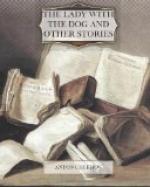Then came the fuss and worry of the trousseau, to which the Pesotskys attached a good deal of importance. Every one’s head was in a whirl from the snipping of the scissors, the rattle of the sewing-machine, the smell of hot irons, and the caprices of the dressmaker, a huffy and nervous lady. And, as ill-luck would have it, visitors came every day, who had to be entertained, fed, and even put up for the night. But all this hard labour passed unnoticed as though in a fog. Tanya felt that love and happiness had taken her unawares, though she had, since she was fourteen, for some reason been convinced that Kovrin would marry her and no one else. She was bewildered, could not grasp it, could not believe herself. . . . At one minute such joy would swoop down upon her that she longed to fly away to the clouds and there pray to God, at another moment she would remember that in August she would have to part from her home and leave her father; or, goodness knows why, the idea would occur to her that she was worthless—insignificant and unworthy of a great man like Kovrin—and she would go to her room, lock herself in, and cry bitterly for several hours. When there were visitors, she would suddenly fancy that Kovrin looked extraordinarily handsome, and that all the women were in love with him and envying her, and her soul was filled with pride and rapture, as though she had vanquished the whole world; but he had only to smile politely at any young lady for her to be trembling with jealousy, to retreat to her room—and tears again. These new sensations mastered her completely; she helped her father mechanically, without noticing peaches, caterpillars or labourers, or how rapidly the time was passing.
It was almost the same with Yegor Semyonitch. He worked from morning till night, was always in a hurry, was irritable, and flew into rages, but all of this was in a sort of spellbound dream. It seemed as though there were two men in him: one was the real Yegor Semyonitch, who was moved to indignation, and clutched his head in despair when he heard of some irregularity from Ivan Karlovitch the gardener; and another—not the real one—who seemed as though he were half drunk, would interrupt a business conversation at half a word, touch the gardener on the shoulder, and begin muttering:
“Say what you like, there is a great deal in blood. His mother was a wonderful woman, most high-minded and intelligent. It was a pleasure to look at her good, candid, pure face; it was like the face of an angel. She drew splendidly, wrote verses, spoke five foreign languages, sang. . . . Poor thing! she died of consumption. The Kingdom of Heaven be hers.”
The unreal Yegor Semyonitch sighed, and after a pause went on:
“When he was a boy and growing up in my house, he had the same angelic face, good and candid. The way he looks and talks and moves is as soft and elegant as his mother’s. And his intellect! We were always struck with his intelligence. To be sure, it’s not for nothing he’s a Master of Arts! It’s not for nothing! And wait a bit, Ivan Karlovitch, what will he be in ten years’ time? He will be far above us!”




